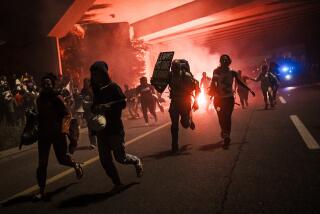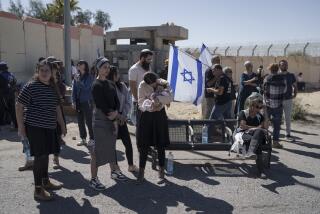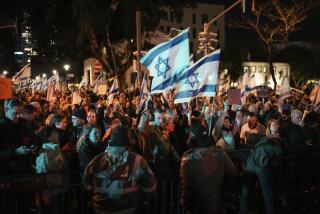Egypt protests continue; opposition rejects talks with Morsi
CAIRO -- Egypt’s main opposition coalition rejected talks with President Mohamed Morsi on Monday as anti-government protests gripped the nation for a fifth day and the army was given powers to arrest civilians.
Six people died across the country, including a bystander shot by rubber bullets as clashes surged between protesters and security forces on the edge of Cairo’s Tahrir Square. Four police stations were set ablaze, and prisoners escaped in the coastal city of Suez.
Central security forces fired volleys of tear gas at rock-throwing protesters along the Nile in downtown Cairo, where most tourist hotels are located. At least 590 people were injured nationwide in a spasm of anger against Morsi and his Muslim Brotherhood party.
A political solution to end the widening unrest seemed unlikely. The upper house of parliament approved government-proposed legislation giving the military powers to arrest civilians, a move that echoed the country’s sweeping emergency law under deposed President Hosni Mubarak.
“The National Salvation Front will not accept dialogue that will not benefit Egyptians,” said Hamdeen Sabahy, a former presidential candidate and member of Egypt’s main opposition. “Morsi must announce his full responsibility for the spilled blood of Egyptians.”
During clashes in Cairo, protesters gathered to pray alongside the Kasr El-Nile Bridge in memory of those killed on Jan. 28, 2011, one of the bloodiest days of the uprising that overthrew Mubarak. Tear-gas canisters flew above their heads as security forces tried to push back demonstrators who had threatened to storm the upper house of parliament.
“The central security forces hit heavily with tear gas, chased the protesters to tire them out, then quickly retreated,” said Mohamed Abdelhamid, a 20-year-old university student. “They will continue this violence until Morsi orders them to stop.”
Protesters clashed with security forces across 11 Egyptian cities. Protesters have surrounded government buildings in Cairo, Alexandria and Suez. In Cairo, thousands marched to Tahrir Square to shows solidarity with those who were killed in clashes early Monday morning.
The nation’s main opposition, led by Nobel Peace Prize laureate Mohamed ElBaradei, demanded that Morsi form a “salvation government” that represents all Egyptians, “not just the Muslim Brotherhood.” The opposition has threatened to boycott parliamentary elections expected in the spring.
Morsi said the national dialogue would take place, despite the opposition’s refusal to attend. Members of the Salafist movement, an ultra-conservative Islamist group, said Monday they would attend the talks.
Though most protests across the country are spontaneous, it is unclear how much influence Egypt’s main opposition has on the ground. The opposition’s threats to boycott elections were criticized by activists as not capitalizing on the Brotherhood’s increasing unpopularity.
“Most of the high positions in business and government now belong to members of the Muslim Brotherhood, and Egyptians will not take this anymore,” said Nahly Enany, a 25-year-old business graduate. “We aren’t rising now for the memory of the revolution. This is the first wave of action against the Muslim Brotherhood’s complete control of the state.”
Anger against Morsi’s government is most palpable in the canal cities of Suez, Ismailia and Port Said, which are all in industrial provinces. At least seven people died in Port Said on Sunday after a funeral procession for 32 people was attacked by thugs and security forces.
Protesters in those towns have vowed to defy emergency laws, including a 9 p.m. curfew that was set to begin Monday and last for a month.
[Updated, 1:15 p.m. Jan. 28: In Port Said, thousands of protesters did defy the curfew Monday night. Soldiers did not immediately intervene.]
“What happened in Port Said is a humanitarian crisis, but this isn’t the only reason we are rising,” Enany said. “We have an administration of liars, and people who live below the poverty level and are dirt poor. We can’t take this anymore.”
ALSO:
Iran arrests more than a dozen journalists
More deaths of Afghan police; toll rises to 21
Amid controversy, Israel issues new birth-control guidelines
Times staff writer Jeffrey Fleishman contributed to this report.
More to Read
Start your day right
Sign up for Essential California for news, features and recommendations from the L.A. Times and beyond in your inbox six days a week.
You may occasionally receive promotional content from the Los Angeles Times.






